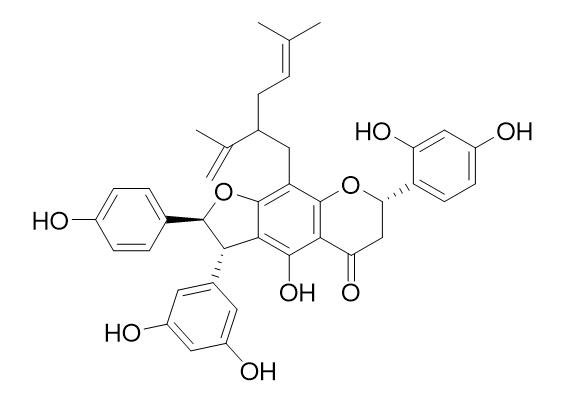Alopecurone A
Alopecurone A exhibits potent inhibitory activity on MRP1.Alopecurone A exhibits cytotoxic activity in DU145 (prostate cancer cell line) and MCF-7 (breast cancer cell line) cell lines with IC50 values of 2.44 and 5.44 μg/mL. respectively.Alopecurone A has antibacterial activity against methicillin-resistant Staphylococcus aureus.
Inquire / Order:
manager@chemfaces.com
Technical Inquiries:
service@chemfaces.com
Tel:
+86-27-84237783
Fax:
+86-27-84254680
Address:
1 Building, No. 83, CheCheng Rd., Wuhan Economic and Technological Development Zone, Wuhan, Hubei 430056, PRC
Providing storage is as stated on the product vial and the vial is kept tightly sealed, the product can be stored for up to
24 months(2-8C).
Wherever possible, you should prepare and use solutions on the same day. However, if you need to make up stock solutions in advance, we recommend that you store the solution as aliquots in tightly sealed vials at -20C. Generally, these will be useable for up to two weeks. Before use, and prior to opening the vial we recommend that you allow your product to equilibrate to room temperature for at least 1 hour.
Need more advice on solubility, usage and handling? Please email to: service@chemfaces.com
The packaging of the product may have turned upside down during transportation, resulting in the natural compounds adhering to the neck or cap of the vial. take the vial out of its packaging and gently shake to let the compounds fall to the bottom of the vial. for liquid products, centrifuge at 200-500 RPM to gather the liquid at the bottom of the vial. try to avoid loss or contamination during handling.
Res Pharm Sci.2023, 18(3):244-261.
Nutrients.2022, 14(23):4997.
Eur J Pharmacol.2023, 951:175770.
Chem Biol Interact.2024, 394:110995.
Nat Prod Commun.2017, 12(5):771-778
Fitoterapia.2022, 157:105130.
J Sci Food Agric.2017, 97(5):1656-1662
PLoS One.2018, 13(3):e0193386
Mol Med Rep.2022, 25(1):8.
Foods.2021, 10(11):2754.
Related and Featured Products
Nat Prod Res. 2014;28(23):2195-2198.
Flavonostilbenes from Sophora alopecuroides L. as multidrug resistance associated protein 1 (MRP1) inhibitors[Pubmed:
24956120]
Flavonoids have always attracted much attention due to their reversal activity on multidrug resistance (MDR). Eight flavonoids isolated from traditional Chinese medicine Sophora alopecuroides L. were applied to test their effect on MDR associated protein 1 (MRP1) through the established predicting assay. Three flavonostilbenes (Alopecurone A, B and D) were first found exhibiting potent inhibitory activity on MRP1. All of them dramatically increased 6-carboxyfluorescein diacetate and doxorubicin accumulation in MRP1-transfected U-2 OS cells. The compounds significantly increased the cytotoxicity and decreased the IC₅₀ value of doxorubicin on the MDR cells (12-, 5- and 8-fold, respectively) at a non-toxic concentration (20 μM). Besides, Q-PCR analysis reveals that the MRP1 mRNA level in U-2 OS/MRP1 was also markedly decreased by the three compounds. These findings indicate a new therapeutic role of the herb. The three flavonostilbenes may have the possibility for further development as novel therapeutic reversal agents against MDR.
Lett Appl Microbiol. 1995 Oct;21(4):219-222.
Antibacterial activity of flavanostilbenes against methicillin-resistant Staphylococcus aureus[Pubmed:
7576511]
Three phytochemical compounds (Alopecurone A-C), flavanostilbenes which are produced by condensation between a hydroxyflavanone and a hydroxystilbene, were isolated as major components from the root of Sophora alopecuroides. They uniformly inhibited the growth of 21 strains of methicillin-resistant Staphylococcus aureus with minimum inhibitory concentrations of 3.13-6.25 micrograms ml-1.
Nat Prod Res . 2017 Jun;31(11):1270-1276.
Dereplication of cytotoxic compounds from different parts of Sophora pachycarpa using an integrated method of HPLC, LC-MS and 1 H-NMR techniques[Pubmed:
27696895]
Sophora pachycarpa Schrenk ex C.A.Mey. is an annual plant belonging to the family Fabaceae. The cytotoxic activities of methanol-dichloromethane extracts (1:1) of different parts of S. pachycarpa were investigated on DU145 (prostate cancer cell line) and MCF-7 (breast cancer cell line) cell lines. The root extract of S. pachycarpa was the only extract that showed significant cytotoxic activity with IC50 values of 39.88 and 16.49 μg/mL on DU145 and MCF-7 cell lines, respectively. The root extract was then subjected to RP-HPLC for further fractionations. Among the isolated fractions from root extract, only one of them had remarkable cytotoxic effects with IC50 value of 26.43 on MCF-7 and 7.54 μg/mL on DU145 cell lines. Further purification led to isolation of a compound with IC50 values of 5.44 and 2.44 μg/mL on MCF-7 and DU145 cell lines, respectively. Based on 1H NMR and 13C NMR spectra, together with LC-MS, the structure of the purified compound was assigned as the flavonostilbene Alopecurone A.



